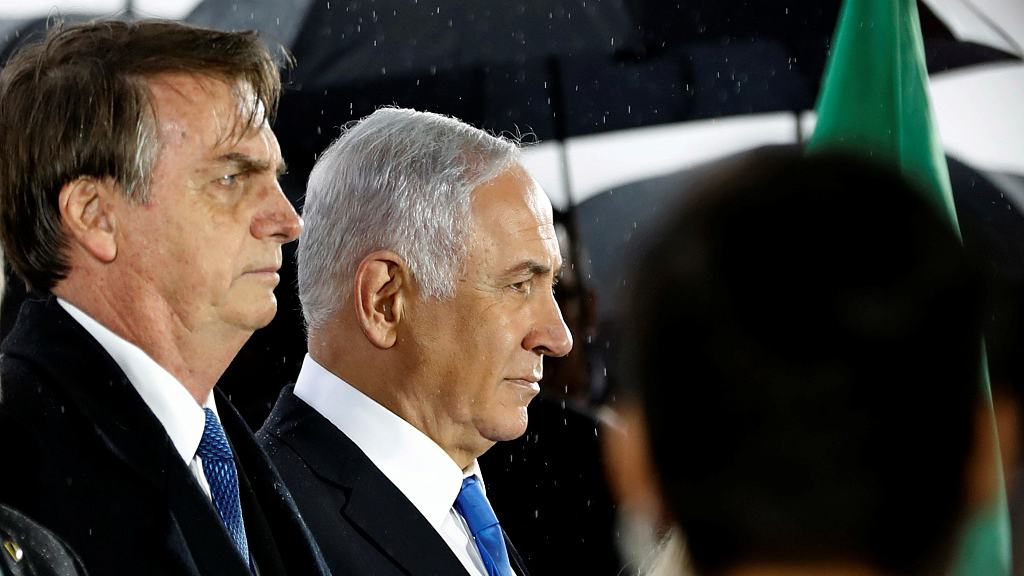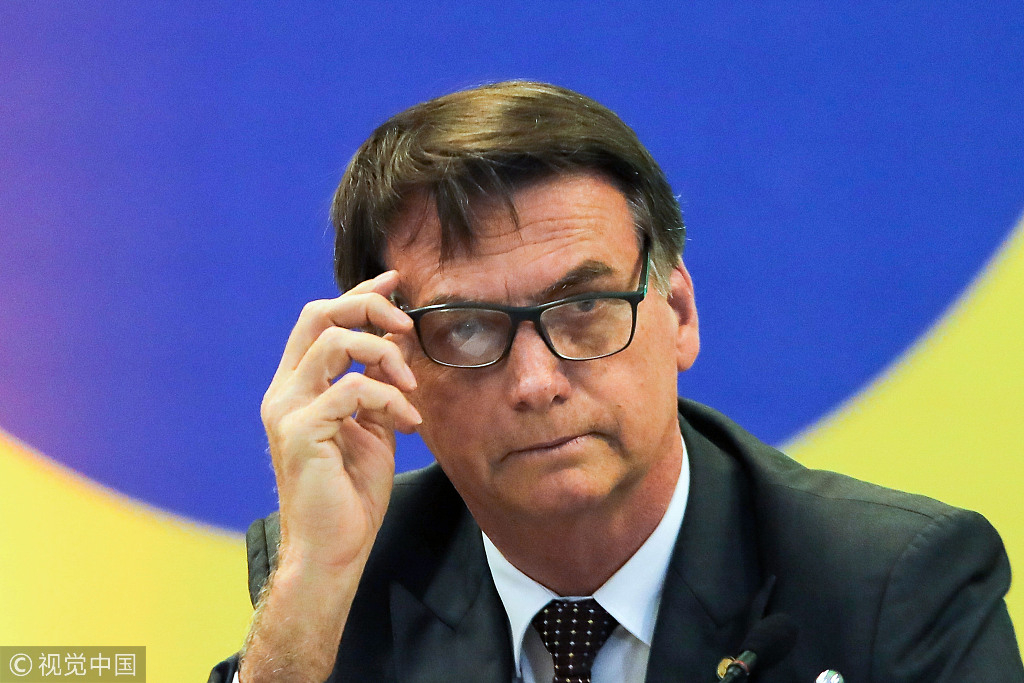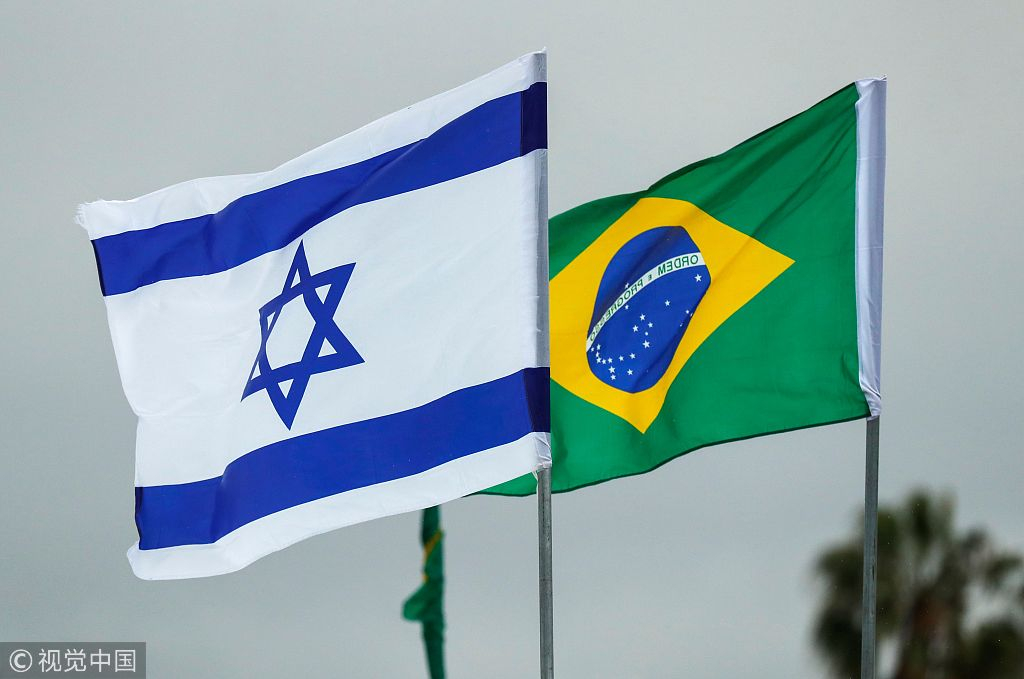
Opinion
15:54, 05-Apr-2019
Why Bolsonaro backs down from an embassy in Jerusalem
Guy Burton

Editor's note: Guy Burton is an adjunct professor at Vesalius College, Brussels and a visiting fellow at the LSE Middle East Center, and the author of "Rising Powers and the Arab-Israeli Conflict since 1947" and "Presidential Leadership in the Americas since Independence." The article reflects the author's opinion and not necessarily the views of CGTN.
On March 31, Brazil's new President Jair Bolsonaro made his long-anticipated visit to Israel. Soon after his election last October, he declared his plan to move Brazil's embassy from Tel Aviv to Jerusalem, which echoed the same decision made by U.S. President Donald Trump at the end of 2017.
Bolsonaro was met at the airport by Israel's Prime Minister Benjamin Netanyahu, who hoped to use the visit for his own reasons: he's facing an election next week and the embassy move would not only boost his own status, but also bolster his claim that Israel is doing well in the world, despite not negotiating with the Palestinians to end their conflict.
But Bolsonaro didn't end up delivering what Netanyahu was hoping for. Instead of the embassy which he promised, he offered to open a trade office in the Holy City instead. The decision was a substantial climbdown from a man who was elected with strong support from right-wing evangelicals and who models himself on Trump, down to the violent language he unleashes against opponents on social media.
Why did Bolsonaro back down? Moving the embassy to Jerusalem would have been extremely controversial. Even though Israel claims it as its capital, the Palestinians do as well. Consequently, it has long been understood that the city's status should be decided by negotiations between the two sides. But that possibility is looking extremely remote, as the peace process between Israel and the Palestinians has been in a deep freeze for at least five years.
Bolsonaro's election pledge wasn't taken lightly in the region. It was met with immediate and negative reaction from Arab and Muslim countries. Shortly after taking office, his agriculture minister, Tereza Christina, pointed out the importance of the Arab and Muslim world for trade: Arab countries and Iran account for nearly six percent of Brazil's exports and 10 percent of all agricultural exports, much of it halal meat. In 2018, Brazil earned 22.9 billion U.S. dollars from the Muslim world. By contrast, Israel pales in comparison: it provides only one percent of Brazil's global trade.

Brazil's President Jair Bolsonaro, gestures during a meeting with the newly elected governors in Brasilia, November 14, 2018. /VCG Photo
Brazil's President Jair Bolsonaro, gestures during a meeting with the newly elected governors in Brasilia, November 14, 2018. /VCG Photo
Next week Tereza Christina will try to defuse Arab anger when she meets diplomats in Brasília. Brazil's foreign minister, Ernesto Araújo, has gone further and is reported to be arranging a presidential visit to Arab countries before the middle of the year. The move may be more necessary now since Bolsonaro neither met with Palestinian leaders nor traveled to any Arab countries during his recent trip.
This contrasted with a decade ago, when Brazil's then leftist President Luiz Inácio Lula da Silva visited the Middle East several times, organized the first South American-Arab summit in Brasília in 2005 and proposed a deal with Turkey to solve the nuclear crisis with Iran in 2010.
But Bolsonaro's climbdown may not be solely down to Arab anger. Domestic politics may be a factor. Although Bolsonaro presented himself as a populist during last year's election, Matias Spektor at the Fundaçao Getúlio Vargas University, has pointed out that his government consists of three factions: conservative anti-communist ideologues like Araújo; a neoliberal right led by his economics minister, Paulo Guedes; and a pragmatic grouping which includes Tereza Christina and several former military officers, among them the vice president, Hamilton Mourao. On the embassy move, it may be that the pragmatic group won out over the conservatives.
The differences in the government are also being played out elsewhere in the government. The education ministry is in crisis, following differences between bureaucrats and an ideological minister. In Congress, the president has been in conflict with party leaders. For presidents to get their legislation passed, they need to build broad coalitions.
This often leads to clientelistic politics, where leaders promise jobs and cash in exchange for votes. Part of Bolsonaro's electoral appeal as a political outsider was to promise a break with this model. But this will prove a challenge, not only because there are about 30 parties represented in Congress, but Bolsonaro's own party, the Social Liberal Party, only accounts for around 10 percent of seats.

The flags of Israel and Brazil. /VCG Photo
The flags of Israel and Brazil. /VCG Photo
It will, therefore, be difficult for Bolsonaro to achieve a change to business as usual, especially as his government prepares for one of the biggest challenges it is likely to face: the constitutional reform of social security.
Brazil spends nearly 13 percent of its GDP on social security benefits, higher than many other richer and older countries and only just below the Scandinavian average. Among the government's proposed reforms are to raise the minimum age for pensions and require workers to make bigger contributions and for a longer period of time. It's likely to be extremely contentious when the reform reaches the floor of Congress and if the public takes to the streets in protest. Little wonder then, that previous attempts at reform haven't been successful. In such circumstances then, it may be understandable if Bolsonaro is focusing attention at home, to expend political capital there rather than abroad.
Finally, Bolsonaro's Israeli U-turn may reflect a broader structural vulnerability for Brazil that goes beyond the country's trade balance with Arab countries. Bolsonaro wants to be a “Tropical Trump,” but he doesn't have the same room to maneuver. Brazil's economy has been in a poor state since 2014, GDP down 3.6 percent for the 2016 following a 3.8 percent drop in 2015.
Since then growth has returned, but it remains sluggish and exposing Bolsonaro. This was brought home less than a week after the election: having criticized China's growing business interests in the country on the campaign trail, Bolsonaro similarly turned around quickly to meet the ambassador and declare his support for more Chinese investment.
In short, Bolsonaro's foreign policy looks to be developing in much the same way as the rest of his presidency. In the six months since the election and which includes his first three months in office, he has tended to start out in an abrasive and aggressive manner, often courting controversy. But when he is challenged and especially when the ground he's standing on seems shaky, he backs away – much as he did in Israel last week.
(Cover photo: Brazilian President Jair Bolsonaro (L) and Israeli Prime Minister Benjamin Netanyahu (R) stand as it rains during a welcoming ceremony upon Bolsonaro's arrival in Israel, at Ben Gurion International airport in Lod, near Tel Aviv, Israel, March 31, 2019. /VCG Photo)
(If you want to contribute and have specific expertise, please contact us at opinions@cgtn.com.)

SITEMAP
Copyright © 2018 CGTN. Beijing ICP prepared NO.16065310-3
Copyright © 2018 CGTN. Beijing ICP prepared NO.16065310-3